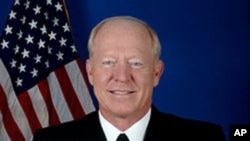The head of the U.S. Pacific Command said Sunday he is confident that American military forces in the Asia-Pacific region will continue to have the support they need to maintain their forward presence.
After the APEC summit, the focus of President Barack Obama's Asia-Pacific trip shifts from trade and closer economic cooperation to security.
He is set to leave Hawaii on Tuesday for Australia, where the two allies are expected to announce an agreement to expand U.S. military access to Australian bases. Then, it is on to Bali and the East Asia summit, which is emerging as a major forum for discussion of security and reducing tensions over issues such as rival claims in the South China Sea.
In remarks to reporters in Honolulu, Navy Admiral Robert Willard said managing the U.S. relationship with China is among five priorities for the U.S. Pacific Command.
On regional concerns about China's actions in the South China Sea, Willard noted the importance of sea lanes for trade, $5.3 trillion annually of which $1.2 trillion of trade involves the United States.
The United States, he noted, works to ensure maritime security and a peaceful resolution of disputes, saying the U.S. military presence helps to prevent a miscalculation that might threaten stability. "It is vitally important that the region remain peaceful and that the sea lines of communication remain uninterrupted by confrontation or any form of conflict that would take place. So we are there to prevent it, and thus far we have been successful in doing that," he said.
Asked whether the expected U.S.-Australia agreement would serve as a "counterweight" in the region to China, Admiral Willard indicated that new access there would help relieve the pressure of maintaining an effective and sustained forward-deployed U.S. presence.
The admiral was also asked about recent remarks by U.S. Secretary of Defense Leon Panetta, who warned that potential deeper U.S. budget cuts for the Pentagon could hamper American military capabilities and possibly "invite aggression."
Referring to a defense posture review underway as the U.S. military transitions out of wars in Afghanistan and Iraq, and budgetary challenges, Admiral Willard said he is confident that decisions made in Washington will not undercut the forces he oversees.
"I have every confidence that in the decisions that our government makes, that our administration makes and that are made in the Pentagon, given the importance of this region to the world and the importance of this region to the United States, that the Pacific Command will continue to be well served and able to carry out its mission of assurance and deterrence where required into the foreseeable future," he said.
Admiral Willard listed other U.S. priorities in the Asia-Pacific region as managing the threat posed by North Korea, "transnational" threats such as countering weapons proliferation, containing violent extremist groups in places such as the Philippines, and containing threats in South Asia by the group Lashkar-e-Taiba.
In South Asia, Willard said, the United States has a "special focus" on strengthening military-to-military ties with India, in areas such as maritime security, including anti-piracy activities.
U.S. officials note that by the end of his Asia-Pacific trip, President Obama will have met with leaders of all of its Asia-Pacific treaty partners, Australia, New Zealand, Japan, South Korea, Thailand and the Philippines.
Deputy National Security Adviser for Strategic Communications Ben Rhodes says that in coming days, Mr. Obama will be speaking more about the range of security issues in the region and the U.S. presence there as he responds to the interest of nations in having the United States deeply engaged, helping address a range of challenges.
US Pacific Commander: Budget Problems Will Not Undermine US Military
- By Dan Robinson














